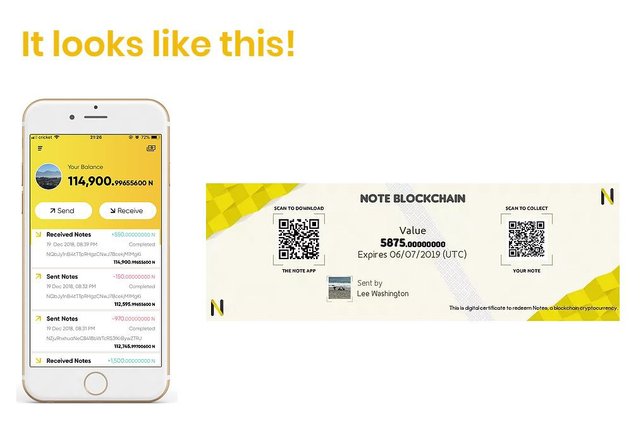
Today we live in a Hyper-connected society, this is a fact and not a secret for everyone.
We Millennials, which corresponds to:
- Generation Y (people born between the early 80's and late 90's (1981 - 1996 precisely)
- Generation Z (all persons born after 1997, for the moment there is no consensus on the end date of this Generation Z)
Live and use technologies, means of communication, on a daily basis, which would make us say "But how could people live without that before?"(especially Generation Z, who never knew the world before the advent of the Internet and the first WorldWideWeb, the first Internet browser in 1989, but that is not the subject of this article). But all of this is the result of long years of research and innovation by our Previous Generations (Generation X (1961 - 1981) and before them the Baby-Boomers Generation).
Let's focus instead on Social Networks, but I'm sorry to tell you, Facebook is not the very first Social Network, and the history of the word "Network" goes back well before the 2000s.
Let's go back in time a bit, in a few key events and dates on the history of the word "Network".
- The earliest use of this word (as far back as Man can remember) is in the 17th Century, and was commonly used by hunters to refer to 'a cloth'.
- The following century (18th century) it is used in the medical field: Blood Network, Nervous Network.
- In the 19th century, it was used to designate paths: Road Network, Rail Network
- In 1954, John Arundel Barnes, British Anthropologist, was the very first person to use the words " Social Networks " in an article. - In the Article "Class and Committees in a Norwegian Island Parish"
Since then, the notion of 'Network' has been used to refer to sets of relationships between individuals, or between 'social groups', first in the Social Sciences, before becoming popular for all individuals.
It is since the 1990s that the expansion of "Social Networks" is due to the development of information technology and modern means of telecommunication.
Now, let's take a look at the history of Social Networking.
Well before our current INTERNET, the ARPANET existed, so we can start this little step back in time, going to the 1970s.
- 1971 : Researchers from ARPA (Advanced Research Projects Agency) managed to send the very first e-mail between 2 computers (they were certainly next to each other, but it was the emblematic event of a new era).
- 1980 : Introduction of ' USENET_ ' we could describe it (simply) as the first protocol allowing users to exchange items between members of a community, which can be spread over a very large area.
- 1989: Birth of our current Internet (formerly ArpaNet) as well as the first WWW (WorldWideWeb)
- 1994 : Launch of the very first Blog, Justin Hall, a student at Swarthmore College (Pennsylvania, USA) was only 20 years old at the time, and had just launch online "Justin's Links from the Underground" which he fed for 11 years. In 2004, New York Times Magazine called him ' The Founding Father of Personal Blogs '.
- 1995: TheGlobe.com was born, allowing users to publish their own content online, and offering the possibility to interact with others with similar interests. The same year Classmates was born (and still exists), this site allowed (and still allows) people to find former classmates and colleagues.
- 1997: Birth of what can be considered the very first ' Social Media Site ': SixDegrees (closed in 2000) with which we could set up a profile page, create a contact list, and send messages within a network.
- 1998: Launch of 'Open Diary', the first Social Blogging Network allowing users to publicly or privately publish their 'diary', and it is also thanks to Open Diary that people will be able to start commenting on other users' 'diaries'. The same year we discover Google and Napster.
- 1999 : Writers put down their ink pen, and start using their 'Virtual Pen', it's the birth of the great era of Blogging with LiveJournal and Blogger.
It has taken 30 years to develop the use and interest of Blogging and Social Networks and it is in this new Millennium that everything has to evolve even faster.
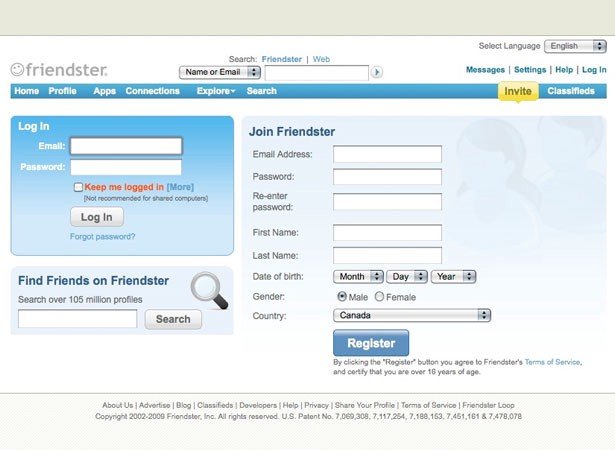
- 2002 : Friendster, real pioneer of the principle of the current Social Networks, allowing to meet new people from its circles of friends, this site reached 3 Millions of users a few months after its creation, for the small anecdote, the 3 founders of Friendster (P. Chin, J. Abrams and D. Lee) refused an offer of repurchase of 30 Million Dollars from Google, which was considered as the biggest blunder of the Silicon Valley. Unfortunately in 2003 the site experienced a spike in popularity that the company did not expect, the servers were saturated, and users began to turn to other sites. Closure of the site in 2015.
- 2003: Very big year for Social Networks, after having deserted Friendster, users turned to the great Rival that was just born, MySpace, which allows users to have a customizable public profile (unlike Friendster where this was only available to registered users). MySpace became the world's most popular Social Network in 2006, but this year also saw the appearance of LinkedIn (now 500 Million users), a Social Networking service with a commercial focus. And the launch of Skype
- 2004: As I told you above, Facebook is not THE very first Social Network, this site was created in 2004, and today has more than 2.4 Billion users worldwide, it has become the most popular Social Network in the world (and still is) since 2008, and has reach the Billion user in 2012.
- 2005: Birth of YouTube, a platform where users can upload and share Videos. On April 23rd of the same year, Jawed Karim (one of the co-founders of YouTube) shares the very first video of this Social Network "Me at the zoo".
- 2006: Twitter was born
- 2007: David Karp (only 17 years old) launches Tumblr, allowing users to publish Photos, Videos, Texts and to 'reblog' their friends, we also see the word 'Microblogging' appearing.
We are not going to list them all, the list would be too long, but here are the other Social Networks that exist: Habbo (2000), Hi5 (2003), Delicious (2003), WordPress (2003), Flickr (2004), Viadeo (2004), Reddit (2005), Dailymotion (2005), Vkontakte/VK (2006), SlideShare (2006), Weibo (2009), Foursquare (2009), Instagram (2010), Pinterest (2010), SnapChat (2011), Google+ (2011) (stops in 2019), Twitch (2011), Medium (2012), Vine (2013), Vero (2015), Discord (2015), TikTok (2017) .. and so many more.
2020 - The Social Network of Note Blockchain!
Far from the enthusiasm at the beginning of this article, I will make an alarming observation. Certainly, Social Networks make us live beautiful adventures, they make us travel, they allow us to discover things that without them we would not even imagine the existence, they allow us to meet new people, no matter their culture, or the place where they are on our beautiful planet, we, the users of this multitudes of platforms see the good sides, and the fulfillment that it brings us. But there is a hidden side, a 'vicious' side if I may say so.
First of all, let's make an impressive list of Statistics (Source: WeAreSocial 30 January 2020)
- World population: 7.75 billion people
- 4.54 Billion people use the Internet (+ 289 Million compared to January 2019)
- 3.80 Billion users of Social Networks (+ 321 Million compared to January 2019)
- 5.19 Billion people have a Mobile Phone (+ 124 Million compared to January 2019)
- We spend an average of 6 hours and 43 minutes a day on the internet.
- We spend an average of 2 hours and 24 minutes per day on Social Networks.
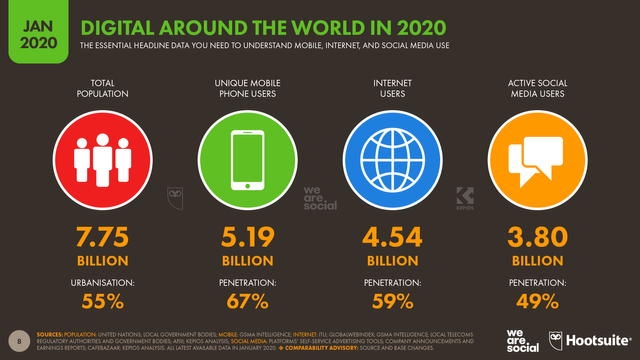
- 2.449 Billion users on Facebook
- 2 Billion on YouTube
- 1.6 Billion on Whatsapp
- 1 Billion on Instagram
- 800 Million on TikTok
- 382 Million on Snapchat
- 340 Million on Twitter
Source Oberlo (November 2019)
- 90.4% of Millennials use Social Networks
- Compared to 77.5% of Generation X
- And 48.2% of Baby Boomers
These datas are just impressive, but here are some less glorious, but just as interesting - Concerning the sale/resale of your personal data, which all the sites and Social Networks in the world practice to earn Billions on your back
Are you familiar with the Financial Times website? This site allows you to find out approximately how much your personal information is worth, for example:
- Age, Gender, Postal Code, Education: $0.0005 per piece of information.
- Ethnic Origin: $0.005
- Your Job: $0.07 to $0.1
- Owner: $0.08
- Diet fan: $0.1
- Health problems: $0.2
- If you have children $0.005
- And lot of more Data
Tell yourself that this simple information is a golden source for sites and Social Networks, to which you give this precious personal information.
Here's what sites earn on average from data resales (Source: Digital Information World - December 2019)
- LinkedIn: $17.10 per user
- Twitter: $9.22
- SnapChat: $4.42
- Pinterest: $3.77
- Reddit: $0.3
- Facebook $0.25
- YouTube: $0.1
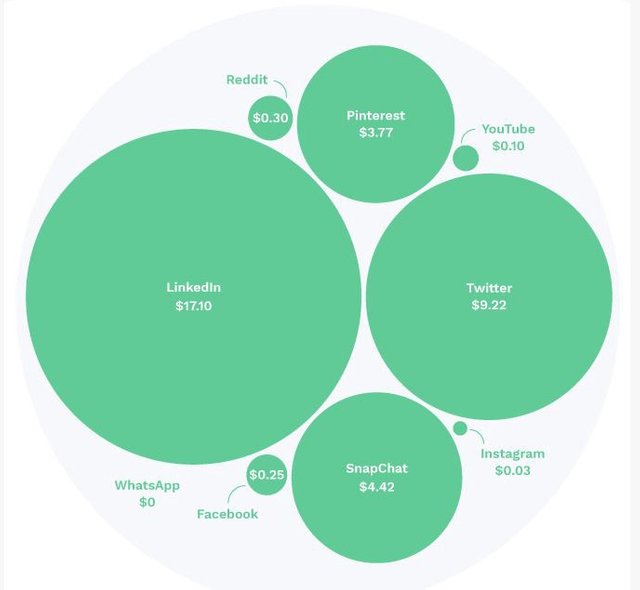
And here is the turnover of the resale data of the sites, with the number of members (Source: Digital Information World - December 2019)
- Facebook: $58.9 Billion - 2.37 Billion Members
- YouTube: $20 Billion - 2 Billion Members
- LinkedIn: $5.3 Billion - 310 Million Members
- Instagram: $3.2 Billion - 100 Million Members
- Twitter: $3.042 Billion - 330 Million Members
Do you find that normal? Especially since it's YOU who bring new members, praising the merits and the good sides of this kind of Social Network, it's YOU who provide them (innocently) with this kind of data, and it's them who sell it for their personal profit! And the happiness of the shareholders! THEY should on the contrary pay you, instead of exploiting you!
I'm not saying that we should boycott these kind of sites, it would be impossible, we can't put pressure on the powers that be like Facebook with these almost 2.5 Billion users, but we should turn to new sites and Social Networks, which do NOT exploit you, which do NOT sell your personal data!
But whether it is you who decides to sell your personal data, and especially to whom to sell it, we have to make sure that you do not sell your personal data.
Social Media has been around for more than 10 years, and its economic/commercial model is still the same, for THEM you are just 'AN INTARISHABLE SOURCE OF INCOME'.
None of the biggest Social Networks (Facebook, LinkedIn, Twitter, SnapChat ...) allow you to monetize your posts, photos, videos, only YouTube makes an exception, by paying 55% of the advertising revenues with the content creators (but this still implies constraints, X hundreds or thousands of views, X number of subscribers, etc ...), while it is the content creators who do most of the work! YouTube is just there to 'host' the work.
Content creators and users alike may find this business model unfair, and are turning to platforms that allow them a greater share of monetization, such as Patreon (to name just one), but this is not necessarily THE solution for content creators and users. (Here is an example between Note Blockchain Social Network & Pateon)
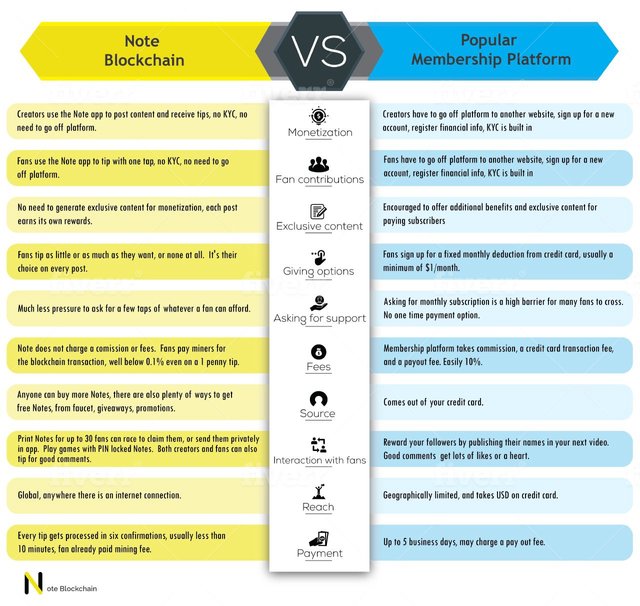
It is in this perspective, and this vision that Note Blockchain wants to stand out from the mass of sites and Social Networks that abuse you, without your consent, just for their personal interest and profit, with Note Blockchain there will be no personal data to exploit or monetize.
On this new Social Network, users will be able to post anything they want, text and/or images (no video at the beginning), and any user will be able to send Tips on posts that interest them, the advantage of Tips in $NTBC (Notes), is that this cryptocurrency (Note Blockchain (NTBC)) is listed on exchanges, and it has a real financial value.
Users will be able to set up from 0.009 NTBC to 10,000 NTBC per Tap, and can use this Tap feature indefinitely (as long as you have enough funds in their NTBC balance).
For example, if you set up 200 Notes (NTBC) per Tap, and you Tap 10 times, the content creator will receive 2,000 Notes.
It will also be possible for users to comment, interact with the content creator, and anyone can also in turn use the Tap function to send Tip if the comment seems relevant (the same principle as the content).
For the launch for this new Social Network (which is currently in the beta test phase), posts will be available 24 hours before disappearing (we will soon work on the automatic deletion time of 24/48/72 hours), and initially it will not be possible to post Videos. And many other features will be added in the future.
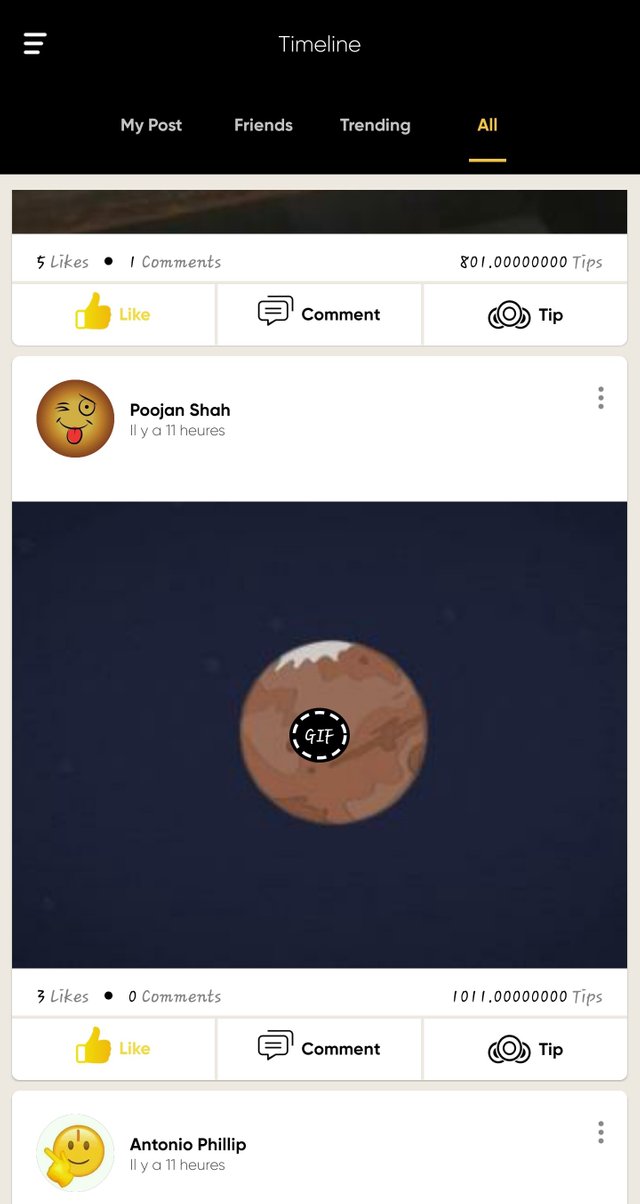
Another great feature will be released, at the same time with their Social Network. Today we can print 1 Note Certificate at a time, so it takes time to create several Notes, but very soon you will be able to :
- Create up to 100 Notes Certificate at once, in the amount you want, one by one (but the (maximum) 100 Notes will all have the same value), so you can post them wherever you want, share them with your friends, family, colleagues …
- You will also be able to issue 1 Note Certificate (the amount you want), which can be claimed by the number of people you define, for example, "I will give 30,000 Notes to the first 30 people who scan it, as soon as we reach X Retweet", so, as soon as it is published, the first 30 people who scan this Note will each receive 1,000 Notes.
For this second feature of the Note Certificate, everything can be checked on the Blockchain, in total transparency, and the same Note Certificate to be posted on several different sites, but the principle will remain the same, the first 30 (based on the example) who scan the Note (regardless of the source where it published) will receive the defined reward (based on the Chronological order of the Note claim).
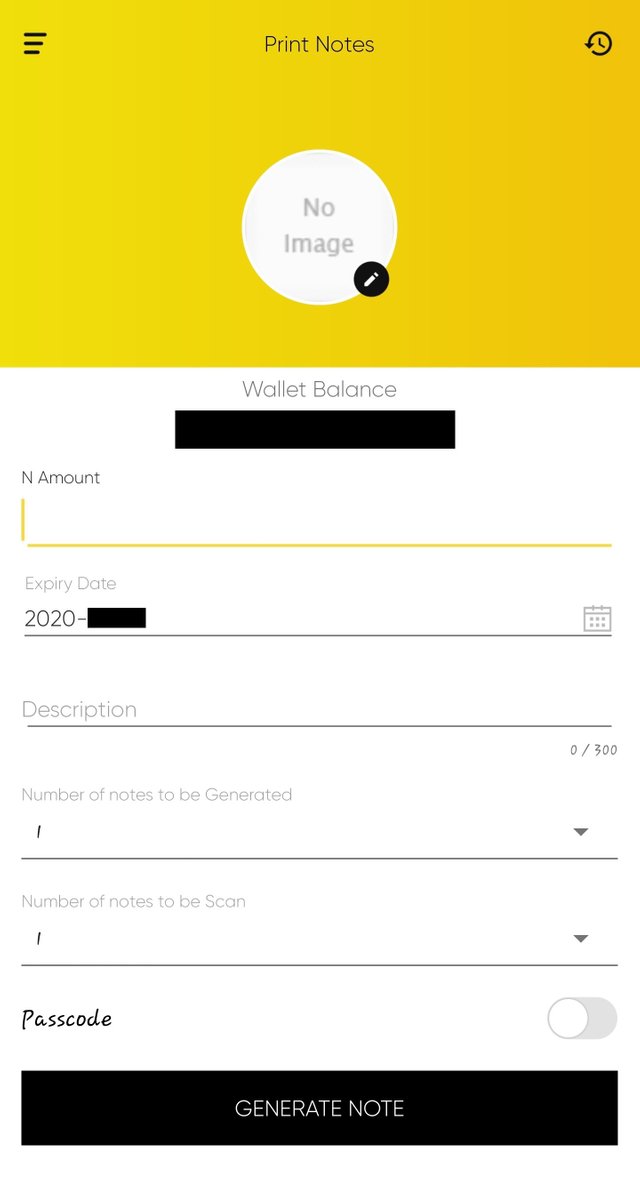
These new features will give creators new ways to attract, reward, and interact with fans.
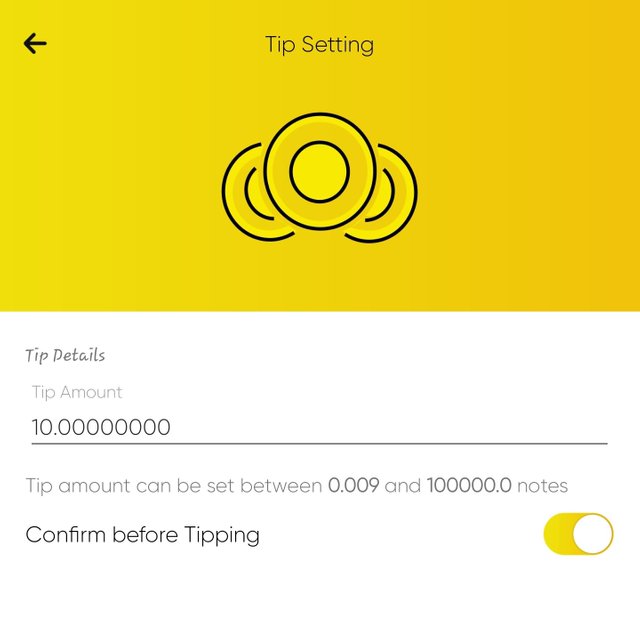
However, it's not enough to simply take advantage of the Blockchain to enable the next generation of Social Media platforms, we (Note Blockchain) believe that such a platform must adhere to the principles of the Blockchain:
- Openness,
- Transparency,
- Resistant to censorship,
- Unrestricted,
- Based on consensus
- And without borders.
What's great about Note Blockchain is that you can get Notes, simply, and for free through a variety of means:
- On Social Networks
- Discord
- Telegram
- Faucet
- The Giveaways
- Mining Notes
And you can also buy them on these sites:
- Unnamed Exchange - With the pairs NTBC - UTIP/DOGE/ETH/LTC/BTC
- Altmarkets - With the pairs NTBC - BTC/DOGE/ETH
The next evolution of Social Networks will be born in 2020, and Note Blockchain will be the Pioneer, join us to learn more, our whole team will be happy to answer you, and take the opportunity to collect some Notes in view of the Official Launch, in the coming weeks, of this new generation of Social Networks.
Watch this short video, showing you how it works.
I would like to especially thank Ethan Shen and all the people who (from the beginning) believe in him and in his vision of the future of Social Networks.
I know that the work they've done so far is just gigantic (and they're not going to stop there), I'm delighted to be able to work with them (within the limits of my abilities and skills), and live this historic moment with the whole Note Blockchain team.
Be a little more patient, and prepare yourself for the imminent arrival of Note Blockchain Social Network.
Thank you all for your trust and your support, see you soon.
Christophe WILHELM
Resources